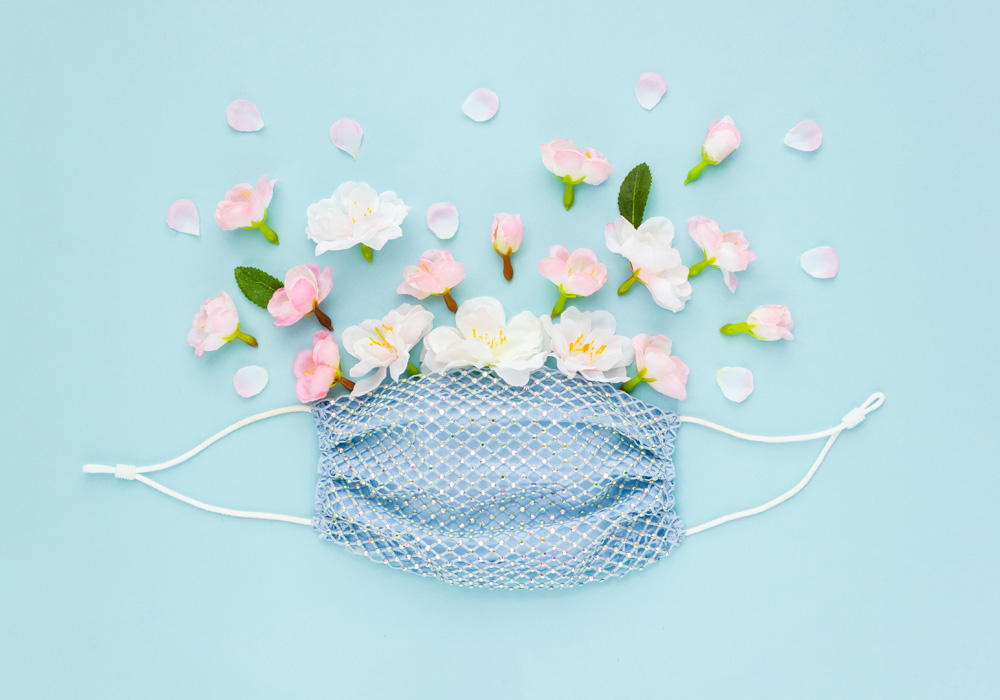For many people, spring is the most beautiful season of the year; flowers are blooming, releasing their wonderful aromas, plant life is growing and humans become more happy, extrοverted and lively. However, the arrival of spring is not such a convenient period for everyone since many people suffer from spring allergies.
Seasonal allergies
In recent years, an increasing number of people worldwide experience seasonal allergies. To a great extent, modern lifestyle, industrialization, environmental pollution and intense stress are largely to blame for this increase in the number of allergy sufferers.
The so-called spring allergies are triggered by various particles circulating in the atmosphere – mainly due to seasonal flowering. Namely, pollen coming from trees, plants and grass, fungi and their spores, as well as house dust mites, are potentially allergenic substances. When these substances entrer the nasal passage of a person who is sensitive, the immune mechanism is automatically activated, since it considers those substances as a threat. Thus, it tries to remove the danger, using common allergic symptoms such as sneezing.
Culprits of spring allergies
Pollen is the main “suspect” for springtime allergies. More specifically, we refer to olive pollen, elxine plant (also known as wild basil) pollen and wild grains (grasses) pollen. Apart from pollen, fungi, which multiply during this season due to increased vegetation along with humidity, as well as house dust mites, which also multiply due to the steep increase in humidity and temperature, exhibit an allergenic activity.
Most common spring allergies
Allergic symptoms originating from spring allergens mainly affect the nose (allergic rhinitis), the eyes (allergic conjunctivitis), as well as the lungs causing “spring” allergic bronchial asthma.
Allergic rhinitis: Usually occurs with symptoms such as headache, runny nose, sneezing, stuffy and itchy nose. Congestion may lead to shortness of breath or easy fatigue, while it is also possible to develop into sinusitis, due to microbes trapped in the sinuses.
Conjunctivitis: Manifests similar symptoms to those of allergic rhinitis, while at the same time, it affects the eyes causing itching, redness and tears.
Allergic asthma: The mild form of allergic asthma presents with a “boil” in the chest and an unexplained dry cough, which causes breathing difficulties, chest tightness and pain. On the contrary, in its most severe form, it causes greater respiratory problems. People with a history of allergic asthma may experience a flare-up during the spring. A strong feeling of fatigue is a potential consequence of allergic asthma.
Prevention strategies
Prevention is undoubtedly better than cure. For this reason, during the flowering season, follow these protective measures:
- During peak hours, when the atmosphere is “laden” with pollen (the greatest circulation of pollen occurs between 7-9 in the morning and 5-7 in the afternoon), try to stay indoors. In other words, avoid unnecessary movements, walks, outdoor sports activities, gardening, etc.
- Keep the windows closed. Use air conditioning at home and inside the car.
- One of the simplest and most effective ways to reduce allergy symptoms is by paying attention to hygiene. Clean your house often to reduce the percentages of pollen to the minimum possible, as well as to remove dust and mites that aggravate the symptoms. Make it a habit to ventilate your home every morning (by 9 am). Additionally, upon returning home, bathe or shower, wash your hands and face thoroughly, leave your shoes on the outside and place clothing into the laundry basket to wash them as soon as possible.
- Wear sunglasses to protect your eyes from various allergens. If you ride a motorcycle, always wear a helmet to prevent the passage of allergens from the nose and mouth.
- Stay informed about the levels of pollen in the atmosphere, by consulting certain mobile apps or weather reports.
However, it is a fact that prevention or avoidance are not always possible. Therefore, in case you face spring allergies, consult and follow your doctor’s advice.

